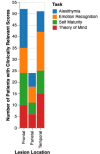The Impact of Brain Tumors on Emotional and Behavioral Functioning
- PMID: 39776739
- PMCID: PMC11705757
- DOI: 10.7759/cureus.75315
The Impact of Brain Tumors on Emotional and Behavioral Functioning
Abstract
While the physical manifestations of brain tumors are well-documented, their impact on the emotional and psychological landscape of patients is of equal importance. Patients frequently experience a range of challenges from depression, apathy, and increased aggression to personality changes. The complexity of these changes and their effects on emotional functioning are shaped by tumor characteristics, including location, growth rate, and the corresponding hormonal imbalances. These challenges may ripple outward, affecting not only the patients themselves but also their caregivers. This review aims to examine the diverse emotional experiences associated with various brain tumor types and locations, through understanding the neurobiological mechanisms underlying these changes. The impact of psychosocial factors on emotional distress and coping strategies is also explored, focusing on the critical role of social support and resilience. The need for integrated care that addresses both the physical and psychological aspects of brain tumors is essential for improving the quality of life (QoL) for patients and their families. The close relationship between emotional and cognitive difficulties is analyzed, stressing how these challenges can mutually reinforce each other, creating a convoluted and challenging situation for brain tumor patients. By understanding and addressing these issues, healthcare providers can better support patients and improve their overall QoL. This review seeks to consolidate the current understanding of this complicated relationship, drawing from an array of studies, reviews, and meta-analyses.
Keywords: behavioural; behavioural functioning; brain tumour; emotional wellness; neurosurgery.
Copyright © 2024, Samman et al.
Conflict of interest statement
Conflicts of interest: In compliance with the ICMJE uniform disclosure form, all authors declare the following: Payment/services info: All authors have declared that no financial support was received from any organization for the submitted work. Financial relationships: All authors have declared that they have no financial relationships at present or within the previous three years with any organizations that might have an interest in the submitted work. Other relationships: All authors have declared that there are no other relationships or activities that could appear to have influenced the submitted work.
Figures



References
-
- Brain cancer: implication to disease, therapeutic strategies, and tumor targeted drug delivery approaches. Shah V, Kochar P. Recent Pat Anticancer Drug Discov. 2018;13:70–85. - PubMed
-
- Caring for someone with high-grade glioma: a time of rapid change for caregivers. McConigley R, Halkett G, Lobb E, Nowak A. Palliat Med. 2010;24:473–479. - PubMed
-
- Palliative and supportive care needs of patients with high-grade glioma and their carers: a systematic review of qualitative literature. Moore G, Collins A, Brand C, et al. Patient Educ Couns. 2013;91:141–153. - PubMed
-
- Distress in patients with newly diagnosed brain tumours. Goebel S, Stark AM, Kaup L, von Harscher M, Mehdorn HM. Psychooncology. 2011;20:623–630. - PubMed
Publication types
LinkOut - more resources
Full Text Sources
